
Just to provide a little background, Resident Evil: Revelations was the first RE game I ever reviewed and served as my re-introduction to the franchise after a long hiatus. Since that time, I’ve also retrospectively reviewed RE4, and, more recently, the RE HD Remaster. Survival horror is a genre for which I have a long-standing and deep appreciation, so it’s likely not surprising that I’m heavily critical of the modern mainline entries. Personally, I felt as if RE6 was a major identity crisis for the franchise, so I’m quite relieved that Capcom chose to go back and explore different avenues by turning Revelations into a spin-off series. (As opposed to continuing with their previous direction.)
Unlike its predecessor, however, Revelations 2 is being delivered as a 4-part episodic series – well, initially anyway. From today, the game will also be available to purchase as a complete package either at retail or online. While the episodic format doesn’t have a damaging impact on the game, it’s certainly clear that it was an afterthought. In almost all regards, the game plays out like a conventional RE experience that’s simply been broken up with some cliff-hangers (kind of like Siren: Blood Curse). Overall, it’s still a fully featured, 8-10 hour game, and also includes all the typical RE extras you’ve come to expect. It’s also only twenty five bucks on Steam if you purchase the complete season.
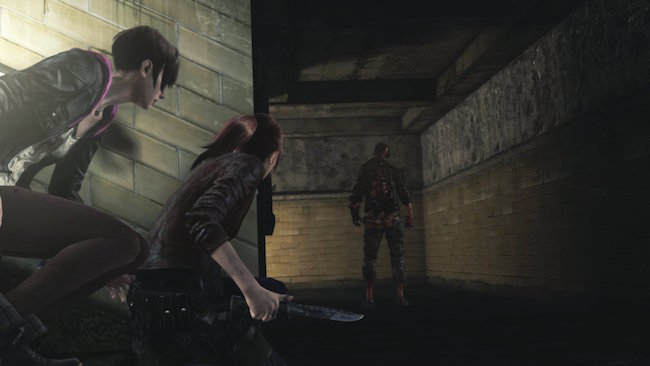
While Revelations 2 is considered a sequel, there are only a few minor references to the events of its predecessor. Instead, the story takes place between the events of RE5 & RE6, and revolves around Claire Redfield and Moira Burton: who have been kidnapped and taken to a mysterious island facility. Upon waking, the duo discover they’ve been equipped with an irremovable wristband that measures the wearer’s fear levels (signified by different colours: green, orange & red). It’s not initially clear why, but before long they learn that a voyeur called the “Overseer” is monitoring them and can communicate via their bands. This is where the plot gets interesting though, because while the girls are trying to find a way off the island, you also take on the role of fan-favourite, Barry Burton who is trying to rescue them. Essentially, each episode is split between two perspectives; allowing the player to experience both sides.
What I like about Revelations 2 more than other recent entries in the franchise, is that it’s primarily character driven, and less about ambiguous government agencies and convoluted bio-terrorism conspiracies. It still has that traditional RE absurdity laced throughout the narrative, but it’s much easier to get caught up in because the characters are all personally motivated. It’s also very exciting to have two classic protagonists return, while shaking up the formula with original characters to create two unique teams and perspectives. The first addition, Moira (Barry’s daughter) is a bit of a “rebellious youth” type who often speaks candidly and brings a balance to Claire’s more straight-laced personality. On the other side, Barry is fatefully paired with a mysterious young girl that he meets upon arrival; who also has a wristband and is key to uncovering the island’s mysteries. Naturally, the bond they inevitably develop is very endearing.
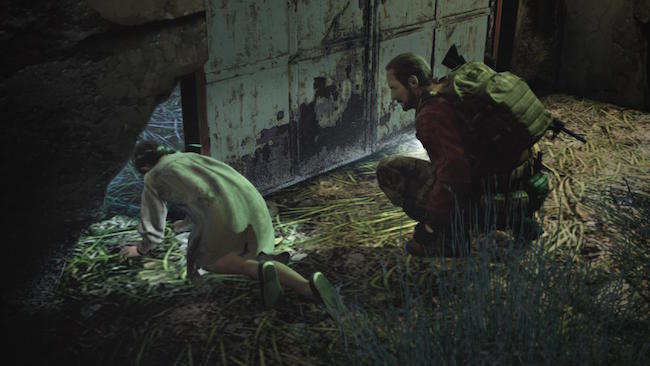
Admittedly, the story doesn’t really break any new ground, but having just played RE HD Remaster, it was the type of story that resonated perfectly with where my head was at with the franchise. Resident Evil, in my opinion, works best when it’s driven by character stories and a compelling villain, and Revelations 2 absolutely nails that core foundation. Something else I also appreciated – and think deserves mentioning given recent controversy – is how three out of the four protagonists are female. Furthermore, they’re not disempowered or helpless (or semi-perv material like Ashley from RE4). They’re actually pretty good characters, and I like that Capcom doesn’t make a big deal about it. But, of course, it’s easier to focus on something like the costumes in Dead or Alive 5, than acknowledge when it’s done right. It’s also worth nothing that if you purchase the complete season, you will receive two “bonus episodes” that provide additional stories for both Moira and Natalia. They’re average overall, but still provide interesting context to the story.
The strength in Revelations 2’s design is in the duality of the approach, as well as the balance of the characters that are paired together. Claire and Barry are both your typical RE heroes with varying weapon loadouts, but unlike the previous RE companions, Moira and Natalia provide an entirely new spin on things. Moira can’t shoot guns, but she does have a crowbar that can be used for melee attacks and opening special crates. She also has a flashlight which can be used to spot hidden items or slow pursuers. Natalia, on the other hand, can throw bricks to stun enemies, as well as sneak silently and sense monsters through walls. If you’re playing single-player, you can switch between both at any time; but what’s good is they don’t get in your way or become a burden. It also sets up a great foundation for genuinely interesting co-op play; but, unfortunately, I couldn’t test this as the PC version is still “missing” this feature.
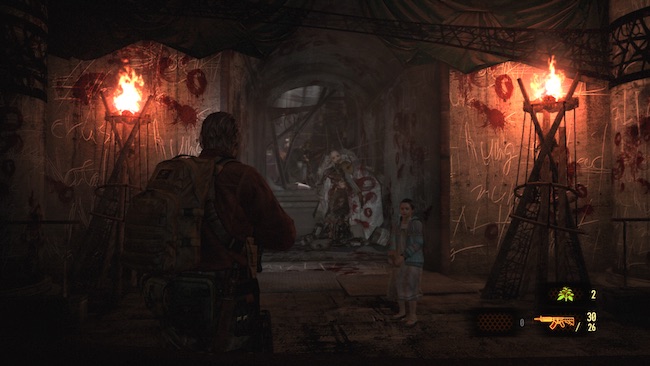
What’s surprising, however, is how this is arguably the most confident Resident Evil in a long time. It knows what sort of game its meant to be, and while it’s still a much more linear adventure than the original-era games, the developers have done a good job in blending the new with the old to take a step back from the confused, action-heavy approach of RE6. In a way, the game is more streamlined – in that you use herbs in real-time by holding down a button – but you also have to craft items on the go and manage an inventory that doesn’t actually pause the game. Don’t worry though, you’re often given plenty of time to plan, as well as work benches where you can upgrade your weapons with different parts. It’s all very efficient, and I’m a fan of the direction. From my experience, this approach fits very well with the few classic puzzle-driven scenarios while still being flexible enough to support the more action-heavy moments.
In turn, there are some genuinely outstanding scenarios within Revelations 2: from RE4 style shootouts and epic Nemesis-esque boss fights, to classic puzzle-solving and exploring a mansion that’s clearly inspired by the original. In fact, there is a lot of fan service and callbacks to earlier games in the series; with everything feeling totally in place. The problem I personally had with the game, however, is that for every action-packed escape or interesting puzzle, there was always some uninteresting trek through the sewers or a tedious objective to slow down your progress. As a whole, the experience comes together absolutely fine: I just think the pacing could have been a lot better. I also found that the episodic delivery emphasises the games lower points by splitting it up, where it really would have come together much better had it been released traditionally – then again, at least we get a cheaper price as a result, right?
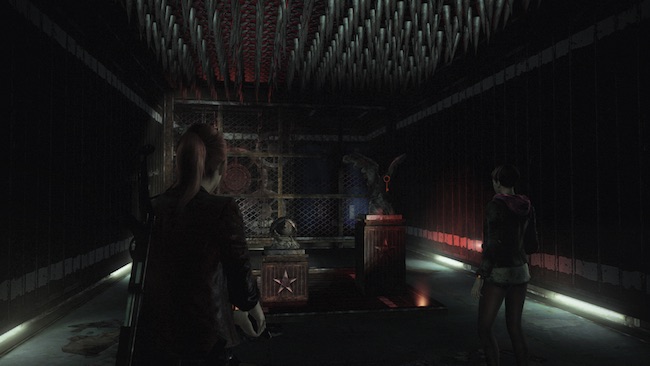
Gameplay has been a pretty kettle of fish in Resident Evil for a long time now; with the game’s mechanics being under constant fire since the success of RE4. The thing about RE4, however, and why it still plays so well today, is because the game was specifically designed around those mechanics. Essentially, the pace at which the game escalated, and the way the enemies would engage the player fit flawlessly with the systems in place and made the player feel empowered. Meanwhile, RE5 tried to pull off things done in other modern shooters but failed to upgrade its mechanics accordingly and felt outdated. Again, it was the same with RE6 which felt even more awkward as the mechanics failed to serve the game. Revelations HD, on the other hand, was a step in the right direction. It felt as if the mechanics had been designed for the game I was playing; though, a little clunky as it was technically a 3DS port.
It’s taken a very long time – a decade, in fact – but I think Capcom finally caught on. They’ve just now realised they need to look at how Resident Evil can do things better, rather than looking at what other franchises are doing and then simply trying to copy that. For the first time since playing RE4, I felt sufficiently empowered, and that was equally so with all four characters. The environments and enemies have all been designed to fit in properly with the game’s mechanics; which are relatively smooth apart from the odd hiccup and an occasionally sluggish camera. You can walk and shoot, sneak, use herbs easily, access your inventory quickly, and swap characters with the push of a single button. Furthermore, the game strongly embraces the duality of each team by working each character’s abilities into the gameplay, where swapping is a necessity. I also want to celebrate that the franchise has moved away from QTEs!

One feature I wasn’t expecting to get drawn into was the Raid mode: which basically pits the player in various arenas to face off against enemies of growing difficulty. Initially, it sounds just like a typical “horde mode,” but the difference here is that each level is confined as its own unique challenge. In addition, unlike the main campaign, this game type absolutely nails the pacing. Raid mode also adds an RPG layer on top of the existing mechanics, by adding levels to the player, enemies and weapons, as well as experience points and currency to use to upgrade your character and equipment between rounds. I think for me, the visible levels and damage counters are what sucked me in – it’s really a lot of fun. Once online co-op is introduced, I could definitely see this becoming much bigger, and keeping the game alive for months to come. Sadly, there are micro-transactions, but I can vouch that they are nothing of consequence.
As a long-established fan of survival horror, I’m often critical of three primary things when it comes to presentation: ambiance, monster design, and the soundtrack. Firstly, with the ambiance, I feel that some “horror” games simply can’t nail that “vibe” that the genre needs to be successful. RE5 and RE6 feel more like absurdly-thematic action games, where you simply don’t experience those feelings of isolation, anxiety, or, when finally in a safe-zone: serenity. The SS. Queen Zenobia in the first game did a good job of nailing that “vibe;” but it wasn’t really consistent across the other scenarios you had to play through. On the other hand, the tone of Revelations 2 feels consistent across the island and between both perspectives. Sure, there are some tropes and cliche environments, but it knows when to let you breathe, and how to push you out of your comfort zone. The style just really resonated well with me, pretty much.
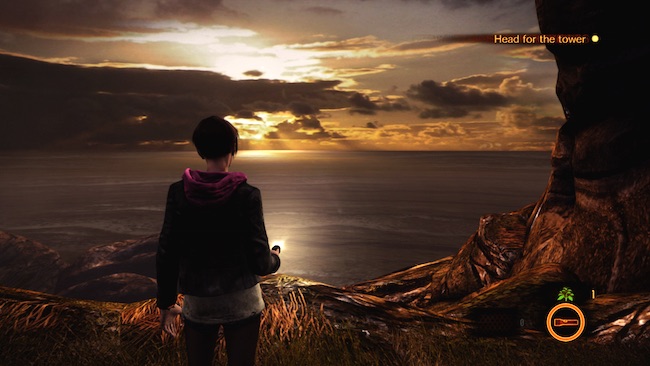
I appreciate not all monsters need to be as thematic as those from Silent Hill, but the enemies in the first Revelations all had a very dull, repetitive “water monster” look to them. Resident Evil has had a long history of interesting enemy designs, so I must say it was good to see some of that artistic spirit recaptured this time round. I noted decent variety with the slower zombies, but it was very nice to see some interesting original types that required special tactics to defeat. The invisible ones that only Natalia can see were my favourite source of frustration. Bosses are also a pretty big deal for the franchise and having just played RE HD Remaster, I’ve become re-accustom to giant snakes, killer sharks and all sorts of interesting monstrosities. There are some great boss fights in Revelations 2 too, but it’s more because of the strategy than their appearance. (There’s also still way too much of that whole exploding tentacle thing.)
Sound in survival horror is also very important to me: whether it’s listening for enemies, clearly hearing your place in the environment or using background music to set the tone. Overall, I felt Revelations 2 did a pretty good job on all accounts. I was actually reviewing some gaming headsets while playing, so I took extra note of the sound quality. The music also employs some really tense moments, as well as a few surprisingly, feel good tunes. One of my favourite scenes involves Barry carrying Natalia on his back, and the music that accompanied that moment was simply perfect. It’s also worth noting that while some dialogue is a little weird like with many Japanese games, the voice cast did a pretty good job overall. There were also some really cool throwbacks to the original game, too. And lastly, in terms of graphics: it looked great apart from the odd crappy texture. I also had no issues keeping a constant 60FPS on my PC.
 Compelling character-driven narrative
Compelling character-driven narrative
 Knows what sort of game it wants to be
Knows what sort of game it wants to be
 Solid fundamental gameplay mechanics
Solid fundamental gameplay mechanics
 Fantastic ambiance and sound design
Fantastic ambiance and sound design
 Potential longevity with the Raid Mode
Potential longevity with the Raid Mode
 Episodic delivery is clearly an afterthought
Episodic delivery is clearly an afterthought
 Pacing issues detract from the overall flow
Pacing issues detract from the overall flow
 No co-op on PC at launch was really crappy
No co-op on PC at launch was really crappy
Without a doubt, Revelations 2 is the best Resident Evil game we’ve seen since RE4. I don’t say that because I think it’s genre-rocking – it’s not, even though it’s actually very good – I say this because it’s the most harmonious and confident Resident Evil game of the past decade. The biggest problem I’ve had with Revelations 2 is with the pacing, which is further amplified by the afterthought of an episodic delivery, but in saying that, the game still succeeds because it’s built around a mostly polished set of mechanics. It doesn’t have the antiquated combat of RE5 or the QTE action scenes of RE6, it’s just a solid all-rounded survival horror experience. Basically, if you’re a fan of the franchise or the genre, I don’t think you can really go wrong here. With a full campaign, bonus episodes, lots of unlockables and replayability, and the promise of online co-op for Raid Mode, I’d say that Revelations 2 is definitely worth your time and investment.











